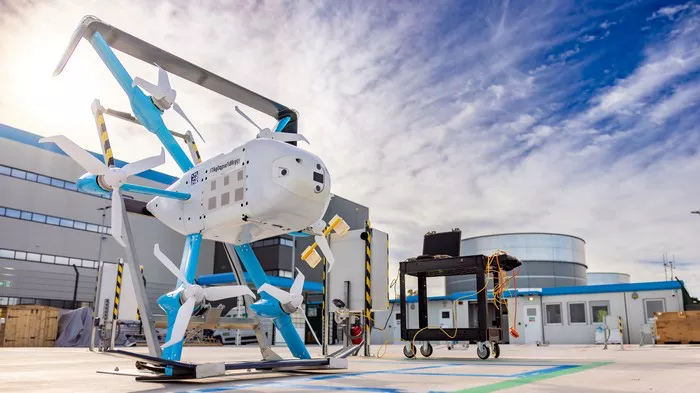Amazon has revealed its plans to introduce drone deliveries in Darlington, UK, marking a significant expansion of its Prime Air service. Customers will soon be able to select drone delivery as an option, with packages expected to arrive within two hours of the order being placed. The company has ambitious goals, aiming to deliver 500 million packages annually via drones by 2029, which is a tenth of its total same- or next-day deliveries last year.
However, before Prime Air can begin operations in Darlington, it must first secure approval from the UK Civil Aviation Authority (CAA) and local authorities, with planning permission required to construct launch pads for the drones. The CAA must assess the safety of the proposed service and create a new airspace for the drones to operate “beyond the visual line of sight.” This approval process is expected to take around nine months, assuming everything proceeds without delay.
The drone deliveries will initially be limited to smaller packages, weighing under 2.3 kg, including electronics, medication, and cooking ingredients. Amazon’s MK30 drones will be able to transport these items quickly and efficiently, but the service will not be available for larger items. The drones will hover approximately 4 meters above the ground, using sensors to check for obstacles before dropping the package. This method is more efficient than previous trials, where customers had to set up a steel sheet with a QR code for the drones to recognize as a drop point.
Despite the technological advancements, Amazon’s drone service faces several challenges. The drones will need to operate in all weather conditions, and Amazon is working to extend the battery life of the drones and reduce their weight. Although Prime Air’s drones will deliver directly to customers’ homes, there are difficulties with delivering to blocks of flats, which Amazon is actively addressing.
Experts believe that drone deliveries have the potential to revolutionize supply chains, especially for remote areas and urgent medical deliveries. However, industry experts like Ellis Shelton, senior policy adviser at Logistics UK, caution that drones will not replace traditional methods of transport like lorries, trains, and ships, due to the massive quantities of goods that must be moved every day. Drones will likely supplement supply chains rather than completely replace existing systems.
Skyports, a key player in the drone delivery sector, has already operated drone services for Royal Mail in the Orkney Islands, reducing delivery times by 24 hours. While drones can be faster, greener, and more sustainable, they are most effective when used for specific, smaller-scale tasks. Drones are seen as a promising supplement to traditional supply chains, offering increased efficiency and sustainability, particularly for urgent deliveries.


